If you go on the Web site for amazon.com — which, as you may well know, sells everything from pickles to garden hoses but built its reputation selling books — enter “self-help books” as a search term.
First, you’ll see that there are 243,000 selections available, so the site helpfully divides the subject into categories, including:
self help & personal development (24,023 titles)
self help motivational & inspirational (20,799)
self help personal growth happiness (6,656)
self help personal growth self-esteem (5,956)
self help personal growth creativity (2,387)
and even self help sexual instruction (4,321)
That’s thousands and thousands and more thousands of books about how to feel better, look better, think better, eat better, sleep better, remember better, love better, and feel better about yourself while you’re doing it.
And at amazon’s Kindle Store, which sells electronic books, you’ll find 33,000 self-help e-books as well.
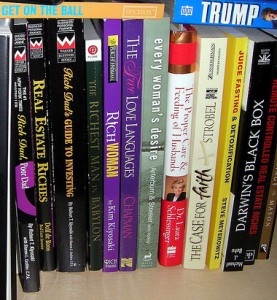
Want to lose weight? Quit smoking? Discipline your children? Get out of debt? Find a spouse? Not a problem. We’ve got a book, e-book, magazine, video, or TV infomercial just for you.
They’re hot, as every American knows, but what I realized, looking into this, is that our self-improvement craze is nothing new.
There have been self-help guides in America since the Revolutionary War. The prolifically published patriot Benjamin Franklin issued some. By the mid-20th century, self-help books and record albums were everywhere, teaching people how to shape up . . .
“MR. STAUFFER’S MAGIC COUCH TAKES THE WORK OUT OF EXERCISE.”
Or how to get ahead in business, or catch a mate.
“BECOME A MENTAL SUPERMAN!”
“HOW TO SOLVE YOUR SEX PROBLEMS WITH SELF-HYPNOSIS!”
“LEARN FARMING IN YOUR OWN LIVING ROOM!”
On long-playing albums, you could find a self-help guru pitching products, ideas, or advice. (Can you picture it, actually putting the record on a turntable, setting down the needle, and sitting back for a scratchy load of advice?)
On one record, aimed at businessmen and entitled “Hammer Home the Difference,” G. Worthington Hipple spelled out checkpoints on the road to success:
One: determination.
When things get tough, the tough get going. All it takes is enough desire and self-discipline to overcome any handicap.
Two: perseverance.
The best defense against procrastination is to deliberately pick out the things you dislike, then do them first. Your day will then be perfect.
And so forth.
Several years ago, Jennifer McKnight-Trontz, a writer living in Florida, noticed that shelf after shelf in bookstores was jammed with self-help books. So many that she wondered how you’d ever pick just the right one that would be good for you.

One of Jennifer McKnight-Trontz's titles. (Chronicle Books)
At used bookstores, thrift shops, and community yard sales, she ran across self-help materials that were 50 or 60 years old. She started collecting them, and then — what else? —published her own book all about them.
But it isn’t full of super secrets of self-help wizards, gleaned from the ages. It is simply a bunch of covers from some of the funniest and most nostalgic self-help books and records. To wit:
When to Bare Your Chest!
Pretty Clothes Do Bring Happiness!
Don’t be Old-Fashioned. 1947’s Sex Discoveries Now Revealed!
McKnight-Trontz also compiled a book with nothing but home-economics tips from the era, not so much earlier, when it was assumed that “the wife” spent her days in the kitchen. And another tongue-in-cheek book with tips on becoming popular and making the grade with others. Here are some of the chapter titles from that!:
Mirror, Mirror. Are you the fairest one of all?
The Magnetic You. How to attract.
Best Friends. And how to get them.
The Life of the Party. It’s you!
And True Love. The most important popularity of all!
This sort of advice reminds me of a magazine advertisement, probably from the 1950s, that someone sent me. It was for a kitchen appliance, and the copy read: “The Chef does everything but cook. That’s what wives are for. I’m giving my wife a Kenwood mixer.”
Another ad shows a smiling woman beaming as she beholds her Christmas present: a vacuum cleaner. The copy reads: “Christmas morning, she’ll be happier with a Hoover.”
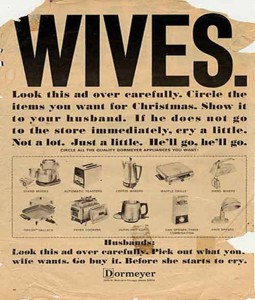
See for yourself! Wives had to be dutiful to hubby, but could use their seductive powers to get . . . products! Hard to believe this appeared in the 20th Century.
Still another one reads, in huge letters: “WIVES.”
Underneath, the copy instructs, “Look this ad over carefully. Circle the items you want for Christmas. [All are kitchenware such as toasters.] Show it to your husband. If he does not go to the store immediately, cry a little. Not a lot. Just a little. He’ll go, he’ll go.”
Ya think the quaint books from yesteryear that Jennifer McKnight-Trontz snagged were paternalistic?
So was the music. Jack Jones, for instance, sang “Wives and Lovers”:
Hey little girl, comb your hair, fix your makeup.
Soon he will open the door.
Few women were portrayed as working outside the home. Their every thought was directed at the needs and comfort of the man of the family — the “breadwinner” — who was king of his castle.
For wives should always be lovers, too.
Run to his arms the moment he comes home to you.

So a good way to please your husband and look better is to . . . work harder! I feel a Gloria Steinem comment coming on.
Whole checklists about how to keep husbands happy were published.
Help Your Husband Get Ahead!
Will You be a Successful Wife or an Unhappy Old Maid?
The Kind of Woman a Man Wants!
One book from the 1950s even taught women how to belly-dance for their “hubbies.”
And a woman named Debbie Drake recorded an exercise album in which she said men need “constant attention and affection.”
No wonder women flocked to self-help books, trying to find self-esteem through something other than just “hubby.”
Writer Jennifer McKnight-Trontz told me there’s something inherent in the American character that makes these books especially popular:
Anyone can become successful in this country. It doesn’t matter what kind of family you were born in or where you come from or how poor you started out. It’s that whole idea that people — if they work hard — can make a success of themselves. I think sometimes these books may not give you the absolute necessary tools you need to succeed, but they give people hope. It gets you inspired.

Mind power was an important attribute, according to early self-help books. A good memory was particularly useful to a man, it was said, because he met so many people in the course of a hard day’s work. Even as a pimply-faced teenager, I remember trying to master memory-improvement books that taught techniques such as word association.
If you met a man named Mr. White and thought it was vital to remember his name, you’d study his face and try to picture a snow-covered mountain. Of course, in my case, I’d meet him later and call out, “Well, hello, Mr. Snow!”
These days, I wouldn’t remember him at all, even if his name was Mr. Kilimanjaro.
All this memory training was important to men, you see, because, you’ll recall, the “little woman” was busy at home, getting beautiful for her husband.
I remember running across a woman’s self-help audio tape called “Coiffure Dynamics,” in which a male speaker intoned with a thick French accent:
Bonjour. Lesson one. Apply your setting lotion as evenly as possible and comb your hair back behind your ears until it is flat and sleek.
And besides looking ravishing, the “lady of the house” was supposed to be in the best of moods when her darling walked in.
Such, my friends, were the seeds of the women’s-liberation movement.
There were a few self-help ads directed at men, mostly having to do with succeeding in business and looking good doing it:
Build a dynamic physique through vibro-power.
Would you like to become two to four inches [five to ten centimeters] taller in only six weeks?
Some campaigns aimed at both sexes. If you wanted to stop smoking, lose weight, or play better golf, you could even learn in your sleep! Or, as “Raveen,” a sinister-looking fellow with a menacing goatee, piercing eyes, and a single name, taught those who bought his records: simply apply self-hypnosis!
Just get yourself completely relaxed. Good. Gaze at one position high above your head. Breathe deeply and relax. Yes, your eyes are already warm. They are moist, they are watery. Your eyelids are very heavy . . .”
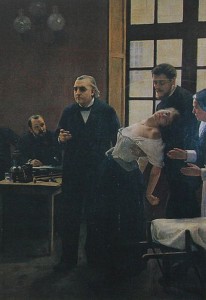
I tried hypnosis, just for fun. “Your eyelids are getting heavier,” I’d say, ever so softly, to a friend. “Heavier and heavier.”
Didn’t help me a bit, but it made my dog, Taffy, drowsy.
Jennifer McKnight-Trontz told me she didn’t think she’d become a neurotic wreck reading all those self-help books and listening to self-improvement records. “I wasn’t looking to be changed,” she said. “I wanted to be an outsider looking at them. Because if you do think about all these things you’re supposed to do and the way you’re supposed to look, then you would fall apart.”
But that’s the idea, isn’t it, at least from the point-of-view of today’s self-help writers? You are neurotic, inadequate, unloved, desperate to make the grade. I can help! Buy my e-book.
When I discussed this topic in our weekly VOA feature-writers’ meeting — in which, you may recall, I’m the only man among six to eight attendees — a colleague laughed about the self-help craze.
“Yeah,” she said. “And they all use 10 sure-fire words to get readers.”
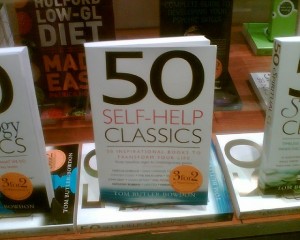
That’s pretty smart! Combine self-help with Americans’ love of lists: 50 Ways to Find Happiness; 12 Keys to True Love, etc.
Here are the 10 can’t-miss self-help buzzwords:
Tips. Dare. Dream. Great. Better. Find. You, too. How to. (We’ll count those as one word each.) Secrets. Success. And, course, Sex.
Hmm. I could get rich with my new self-help best-seller:
You Too Can Dare to Dream: Secret Tips on
How to Find Great and Successful Sex
It’s getting there, but I’ve got to figure a way to work in “Better.”
Ted's Wild Words
These are a few words from this posting that you may not know. Each time, I'll tell you a little about them and also place them into a cumulative archive of "Ted's Wild Words" in the right-hand column of the home page. Just click on it there, and if there's another word that you'd like me to explain, just ask!
Making the grade. Measuring up to others’ expectations.
Prolific. Productive, producing many things. The word comes from biology, referring to plants that produce much foliage or people who have many children.
Ravishing. Delightful, captivating, entrancing.

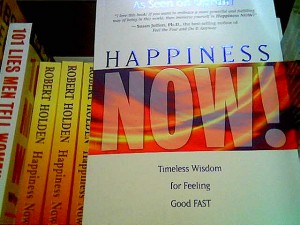

2 responses to “Help Me Help You Help Me”
[…] Help Me Help You Help Me But it isn't full of super secrets of self-help wizards, gleaned from the ages. It is simply a bunch of covers from some of the funniest and most nostalgic self-help books and records. To wit: Don't be Old-Fashioned. 1947's Sex Discoveries Now Revealed … Read more on Voice of America (blog) […]
[…] putting the record on a turntable, setting down the needle, and sitting back … Read more on Voice of America (blog) hopfeed_template=''; hopfeed_align='LEFT'; hopfeed_type='IFRAME'; hopfeed_affiliate_tid=''; […]